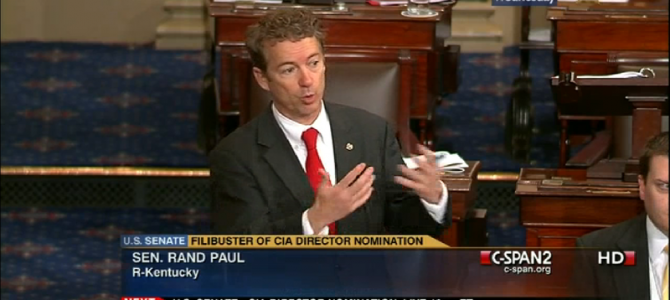So Ted Cruz has had a big week. His 21 hour assault on Obamacare had its intended effect: everyone buzzing about the possibility of defunding or delaying the law on the cusp of its stumbling, bumbling rollout, with Democrat Senator Joe Manchin becoming the first – and likely not the last – to break ranks and endorse delay.
The second tier of buzz, of course, is about the possibility of Cruz’s 2016 presidential candidacy. And that’s had a host of pushback this week from the media, which is essentially framing Cruz’s filibuster as an inconsequential issue except insofar as it makes him unpalatable to Republican donors.
Let’s assume for the sake of argument that the narrative the elite media is framing is true, and that Cruz’s impassioned assault – which led to more collateral damage among the Republican caucus than it should have – is going to hurt him with the Republican establishment (for the record, that means The Money). Who stands to benefit the most from such a result?
The answer is Rand Paul.
It’s a distinct possibility that the 2016 candidate now best positioned to triangulate himself as both anti-establishment and not a creature of the radical base is Rand Paul himself.
The assumption in Washington has been for some time that Paul and his team will inevitably see a Cruz candidacy as a rival for the same portion of the primary electorate (I’ve written before in The Transom why this is wrong, but let’s leave that aside for a moment). Except it’s not apparent that Paul shares that view. He seems – very cannily – to have decided there is no risk of him being painted as anything but anti-establishment on the right… and thus has taken several steps to insulate himself from establishment criticism.
Paul’s endorsements of incumbents and his détente with Mitch McConnell is only one aspect of this. Notice how when Paul went to the Senate floor to give Cruz an assist during his filibuster, he posed a rather odd question about whether Cruz would be willing to settle for something less than full defund.
The path for Paul to the nomination could take many forms. But a path that involves Paul actively, if subtly, turning Ted Cruz into one extreme (from the establishment’s perspective, an Ivy League Sarah Palin) and Chris Christie (Rudy Giuliani without the charm) into the other is impressive and innovative. If this is intentional, it reveals a degree of Machiavellian political skill which goes far beyond the drone filibuster move, the success of which went far beyond what was anticipated even by Paul’s supporters.
Think about it this way: if the defund gambit is indeed Ted Cruz’s Braveheart moment (historical inaccuracies notwithstanding), would you rather be the guy who got disemboweled, or the guy who got the crown?









